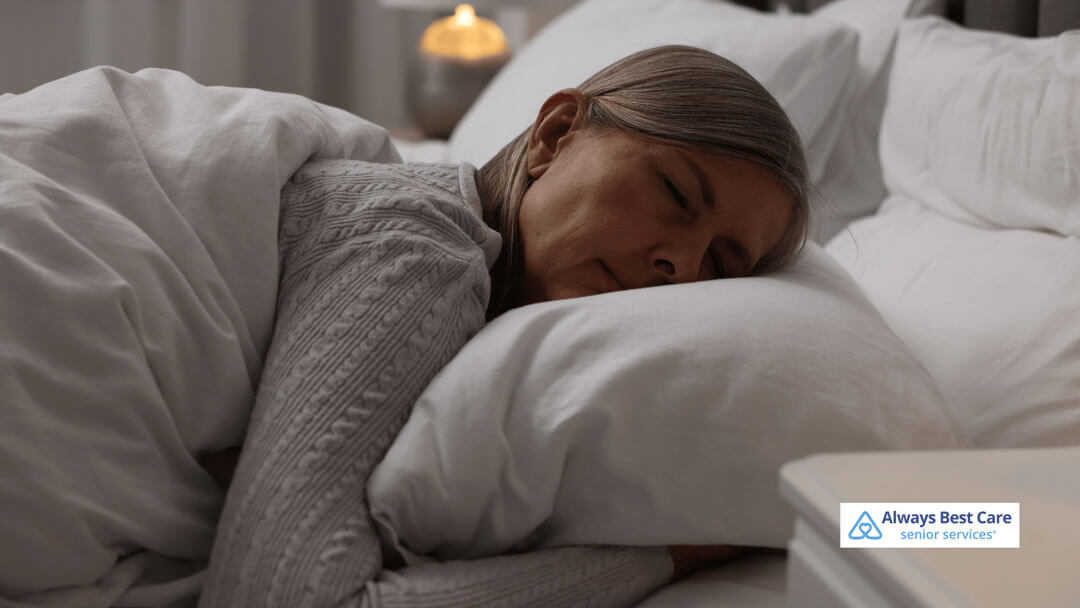Senior Sleep Solutions: 8 Tips for a Restful Night

Getting a good night’s sleep can become more challenging as we age, yet it remains essential for maintaining overall health and well-being.
For seniors, a restful night isn’t just about feeling refreshed—it’s crucial for physical, mental, and emotional health.
If you’ve been struggling with tossing and turning, these eight tips can help you improve your sleep quality.
Table of Contents
Understanding Senior Sleep Challenges
As we age, sleep patterns naturally shift, making it more difficult for seniors to get the deep, restorative sleep they need. Many seniors experience the following sleep challenges:
Difficulty Falling Asleep
As the body ages, changes in circadian rhythms—our internal “biological clock”—can make it harder to fall asleep at a regular time. Seniors may lie awake for long periods before drifting off to sleep.
Frequent Waking during the Night
Another common issue is waking up multiple times during the night. This can be due to various factors, such as discomfort, needing to use the bathroom, or disruptions in the sleep cycle. Even if you fall back asleep quickly, frequent awakenings can leave you feeling tired the next day.
Feeling Unrested Despite Spending Adequate Time in Bed
Some seniors may spend the recommended 7-9 hours in bed but still wake up feeling tired or unrested. This can result from poor-quality sleep or interruptions in the deeper stages of the sleep cycle, which are essential for feeling fully rested.
Health Conditions
Conditions such as arthritis, chronic pain, restless leg syndrome, and sleep apnea can severely impact sleep quality. These health issues may cause discomfort, breathing difficulties, or restlessness at night, making sleep less refreshing.
Side Effects of Medications
Many seniors take medications to manage chronic conditions, and some of these medications can interfere with sleep. For example, certain heart medications, antidepressants, and blood pressure drugs can disrupt sleep patterns, making it harder to fall or stay asleep.
Anxiety and Stress
Mental health plays a significant role in sleep quality. Worry, stress, or anxiety about personal or family matters can keep the mind racing at night, preventing restful sleep. Seniors may also feel more isolated or anxious about their health, which can exacerbate sleep problems.
Changes in Hormone Levels
Aging affects the production of hormones that regulate sleep, such as melatonin. Lower melatonin levels can make maintaining a consistent sleep pattern harder, leading to insomnia or irregular sleep cycles.
Create a Relaxing Bedtime Routine
Establishing a calming pre-sleep routine can signal your body that it’s time to wind down. Whether reading a book, listening to soothing music, or enjoying a warm bath, creating a consistent routine before bed can help your mind and body prepare for sleep.
Adjust Your Diet for Better Sleep
What you eat and drink in the hours leading up to bedtime can significantly impact your sleep.
Avoid consuming large meals, caffeine, or alcohol late in the day, as these can interfere with your ability to fall asleep or stay asleep. Instead, opt for a light snack before bed—foods like bananas, almonds, or warm milk are known to promote relaxation and better sleep.
Optimize Bedroom Environment for Comfort
A comfortable bedroom can make all the difference when it comes to sleep.
Ensure your room is cool, dark, and quiet. Comfortable bedding, blackout curtains, and minimal noise create the ideal environment for a peaceful night’s rest.
Stay Physically Active during the Day
Physical activity can help regulate your sleep-wake cycle, making it easier to fall asleep at night.
Light exercises like walking, stretching, or gentle yoga can be particularly helpful if done earlier in the day to avoid overstimulation close to bedtime.
Use the Restroom before Bed
Waking up multiple times during the night to use the restroom can disrupt your sleep.
Make it a habit to use the bathroom right before going to bed. This simple step can reduce nighttime awakenings, allowing for a more restful night.
Lower Your Stress for Better Sleep
Stress and anxiety are major culprits when it comes to sleep issues.
Relaxing activities like deep breathing, journaling, or meditation before bed can ease a restless mind. Establishing these practices can help lower your stress levels and promote a sense of calm, making it easier to drift into sleep.
Ensure Bathroom Safety for Nighttime Visits
If you frequently wake up at night, ensure your bathroom is set up for safety.
Install nightlights along the path to the bathroom and use non-slip mats on the floor. Grab bars can provide additional stability, ensuring you remain safe during those late-night trips.
Limit Daytime Naps
Although naps can be refreshing, taking long naps during the day can make it harder to sleep at night.
To maintain a healthy sleep cycle, keep naps short—about 20 to 30 minutes—and avoid napping in the late afternoon or evening.
How Always Best Care of Nashville Can Help
For seniors struggling with sleep-related issues, professional support can significantly improve sleep quality and overall health.
We at Always Best Care of Nashville offer personalized in-home care services tailored to seniors’ unique needs. Our compassionate caregivers will assist with creating healthy sleep routines, ensuring seniors follow daily habits that promote better rest!
Caregivers from Always Best Care of Nashville can help by:
- Assisting with nighttime routines, such as preparing a relaxing environment and consistently ensuring seniors are ready for bed.
- Providing medication reminders ensures seniors take their prescribed medications at the correct times to avoid sleep disruptions caused by late-night doses.
- Offering companionship and emotional support, which will help reduce anxiety and stress that often interfere with sleep.
- Ensuring bathroom safety, with nighttime assistance to help prevent falls during late-night trips to the restroom.
Get the Rest You Deserve with Personalized Care!
If you or a loved one are struggling with sleep challenges, Always Best Care of Nashville is here to help!
Our dedicated caregivers provide compassionate in-home support to ensure seniors maintain healthy sleep routines, manage stress, and stay safe throughout the night. Let us help you enjoy more restful nights and better overall well-being.
Contact Always Best Care of Nashville at (615) 678-0293 to learn more and schedule your free consultation!





